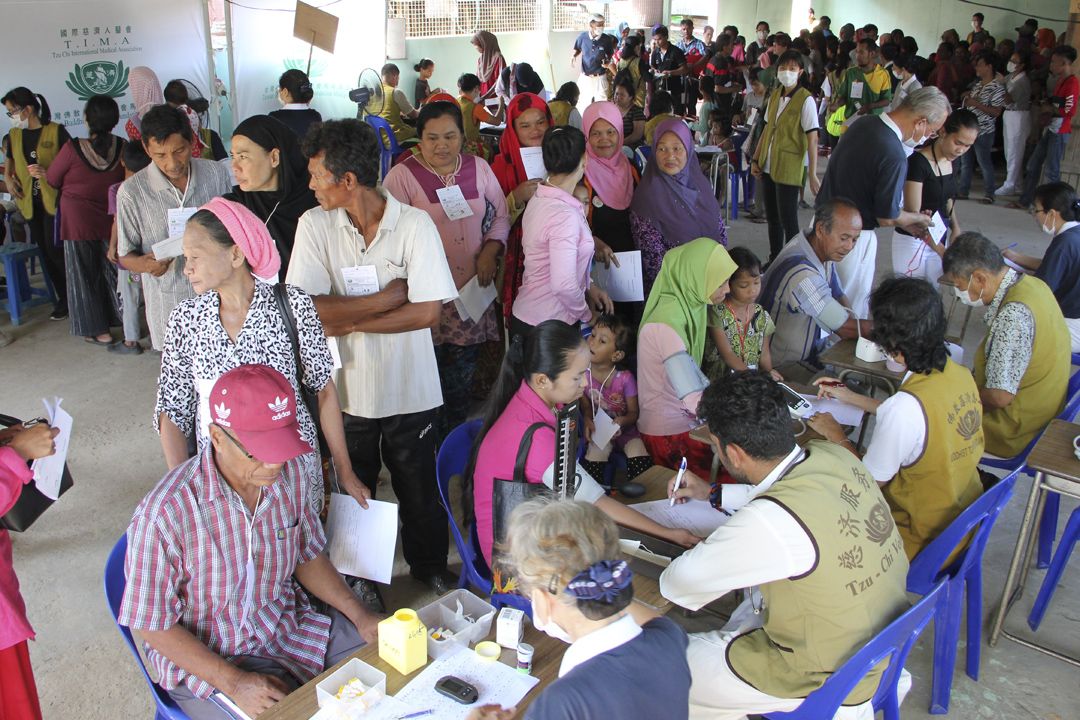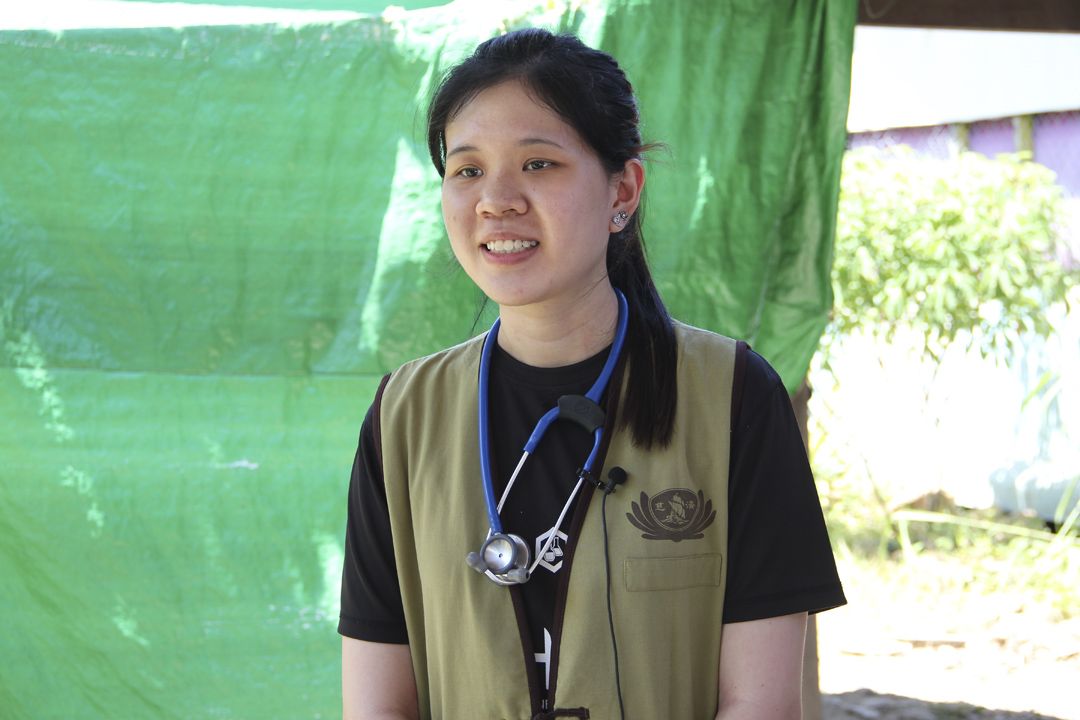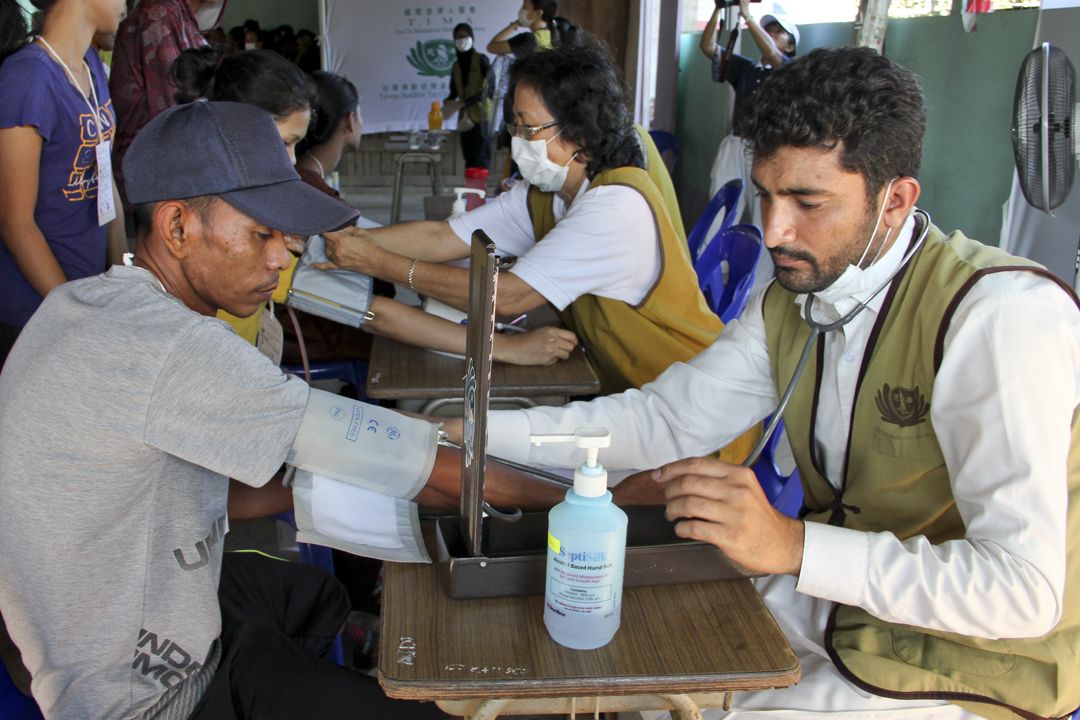Medical services for all in the family
On February 17, 2019, a group of Tzu Chi volunteers and TIMA members organized a medical outreach session – the 8th iteration of its kind – at the Numbak Vision Centre in Sepanggar, Kota Kinabalu. Among the services provided were consultation sessions in general medicine and dentistry, dispensing deworming prescriptions for children, and free haircuts. This medical outreach session saw the participation of 89 volunteers, 19 dentists, 8 physicians, 12 pharmacists, 3 nurses and 20 medical students.
At 8 am, all volunteers and medical personnel involved arrived at Numbak Vision Centre and the adjacent activity centre and started preparing for the outreach session. They handled the registration procedure, distributed consultation forms, and recorded measurements of body height and weight, as well as blood pressure and blood sugar levels at the activity centre, which was buzzing with activity. After undergoing a series of tests, the villagers were led by the volunteers to the Numbak Vision Centre to wait their turn for consultation.

The registration area was crowded by villagers who arrived early for the outreach session. [Photograph by Tham Chee Hsung]
Two classrooms had been outfitted to accommodate two makeshift consultation rooms – one each for outpatient treatment and dental treatment respectively – and a waiting area for dental patients, where information on oral care was disseminated to the patients. The small hall outside the classrooms was converted into a waiting area for outpatient treatment, besides serving as the dispensary. Free haircuts were provided in the front yard of the house next to the Centre. The person-in-charge of the Centre had previously repaired the flooring and installed several ceiling fans, creating a comfortable environment for the villagers seeking treatment.
An ophthalmologist was available to provide consultation services on eye-related conditions and prescribe reading glasses to patients. Mothers with their entire family in tow were a common sight in the general consultation area, with each member of the family presenting different symptoms. The free medical services were a welcome relief for the poor villagers, who struggle to make ends meet. The doctors on duty were patient and conscientious in assessing the patients and addressing their concerns to ensure an accurate diagnosis and ease the patients’ suffering. In the general medicine department, Maylen bte Abu Bakar, who was diagnosed with an ear affliction in last year’s medical outreach session, was eager to report to the volunteers that the medication prescribed by the attending doctor had cured her condition, as well as her children’s skin disorder.
On the other hand, the dentistry department served 292 villagers, save for the villagers who were deemed unfit for tooth extraction due to excessively high blood pressure levels.
Serving patients with care
Leong Sin Chi, a fifth-year medical student from the University of Malaysia Sabah, participated in the medical outreach for the first time and declared it a valuable experience. She added that in medical school, she was trained to perform diagnoses on specimens, but serving at the medical outreach had enabled her to witness first-hand the doctors on duty making an effort to communicate with patients in order to gain a more thorough understanding of their conditions to arrive at an informed diagnosis. She noted that such an approach to diagnosing illnesses differed significantly from that taught during medical training.

Leong Sin Chi participated in the medical outreach for the first time and declared it a valuable experience, as she learnt to communicate effectively with patients to arrive at an informed diagnosis. [Photograph by Tham Chee Hsung]
Throughout the medical outreach session, Sin Chi was guided by her university professor, Dr Kew Seih Teck, who is also a TIMA member. Dr Kew took Sin Chi under his wing and patiently taught her the essentials of communicating with patients. Dr Kew also imparted his knowledge on assessing the root causes of various illnesses, contextualizing it by demonstrating to Sin Chi how to detect the factors causing malnutrition among the young patients present. Sin Chi observed that the village children were afflicted with a host of maladies owing to poor hygiene, and hoped for Tzu Chi to organize more medical outreach sessions across Sabah to extend free medical assistance to those in need.
Muhamad Bilal is an engineer from Pakistan who currently resides in Pulau Gaya to oversee a retail business he took over from a relative. After encountering Tzu Chi volunteers in Pulau Gaya, he had expressed his hope to volunteer for the medical outreach as he recalled taking lessons on healthcare in university. Now, he was tasked with gauging the patients’ blood pressure levels, and surmised that the medical outreach session was beneficial to the villagers, who were ill-equipped to care for their own well-being as they lack knowledge on illnesses.

Muhamad Bilal (right) opined that the outreach session would serve the villagers well, as most of them lack fundamental healthcare knowledge. [Photograph by Tham Chee Hsung]
Dr Thevamalar, 28, a dentist from Labuan, took leave from work to serve at the medical outreach session, specializing in dental screenings and tooth extraction. She recounted that she accompanied her cancer-stricken mother on a trip here to seek treatment, and was acquainted with Tzu Chi when her mother was briefly admitted to Rumah Penyayang Tzu Chi in Likas. She proceeded to sign up as a Tzu Chi donor as a gesture of support for Tzu Chi’s values. She explained that dentists usually refrain from extracting more than one tooth in a single outreach session, hence patients would have to locate a private practice or government hospital to extract the remaining teeth if more than one tooth is decayed and requires extraction. However, the villagers are unable to afford the relatively higher charges imposed by private dental clinics, costing between RM50 and RM60 to extract a single tooth. She also expressed her concern that the villagers are lacking in their knowledge of oral care. In response to this, dentists were stationed at the waiting area to educate the patients on oral care practices. She was moved by the volunteers’ willingness to sacrifice their free time to serve at the outreach session, and pledged to volunteer for the next outreach session.
Seeking the right treatment
Sulaya, a 38-year-old villager who works at a landscaping company, is a single mother of five children aged 4 to 16, the eldest of whom works as a boatman.
Sulaya is experiencing declining health as she is overwhelmed by the pressures of life as a single mother, and has been afflicted with bouts of fever and cough from time to time, in addition to losing her appetite. She used to seek medical treatment at private clinics, costing her close to RM100 in consultation fees at times. But she could no longer afford the prohibitive fees due to burgeoning financial constraints. She hoped that Tzu Chi would continue to organize medical outreach sessions to allow the villagers access to medical attention free of charge.
Sulaya was satisfied with the treatment she received from both the general medicine and dentistry departments. Meanwhile, her children were treated for symptoms of ringworm developing on their lice-infested scalp. Her two sons had their heads shaved bald at the doctor’s advice, while her two daughters had to cut their hair short. The doctor also reminded them to maintain their personal hygiene, in addition to applying the medication prescribed, to keep maladies at bay.
Norkaima is a mother of eight children, but her youngest child died a premature death a month after being born, leaving Norkaima devastated. She had been experiencing blurred vision recently, prompting her to seek treatment from a doctor at the outreach session who performed an eye screening on her. She was diagnosed with presbyopia and fitted with a suitable pair of reading glasses.
She was thankful to Tzu Chi for organizing the medical outreach session close to home, allowing her to bring her children along. Otherwise, she would have to seek treatment from a clinic further away, leaving her children unattended in their home surrounded by the sea, causing her to worry for her children’s safety.
•
The medical outreach session benefitted 595 villagers, culminating in a total of 1,674 sessions of consultation and treatment administered. It is hoped that the volunteers would return to serve in the outreach session next year.




